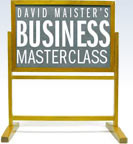

TITLE | TIME |
The Courage to Manage | (17:14) |
How does a manager get his or her operation to begin to behave strategically? What systems are needed and what personal behavior by the manager?
RELATED RESOURCES:
Blog Discussions
Articles
- The Only Competitive Advantage in Professional Services
- The Role of the Manager
- Morale and Company Performance
- Managers and Values
- CPAs and Practice What You Preach
- Why Happy Staff Are Key to Success
- Could Happy Workers Double Your Profits?
- Forget Money, Think Passion
NOTES FOR THE EPISODE:
Timeline:
00:29 —
As I Reported earlier in this seminar series, the single biggest barrier to implementing strategy is managerial courage. What makes super-successful companies (and managers) so impressive is not what they are doing, but the fact that they are doing it.
03:07 —
The lesson is clear. To make something happen, it’s not enough to reward those who choose to participate. You must tackle those who do not. As long as it’s optional (even if rewarded) it isn’t going to be done at the level at which the commercial benefits will kick in.
04:26 —
It is the manager’s job not only to manage financials, but to inspire, cajole, exhort, nag, support, critique, praise, encourage, confront and comfort as individual people (and groups of people) struggle to live their work lives according to new standards, i.e. the strategy. Of all the qualities required of managers, the most essential is courage — the courage to actually manage, and enforce the standards that are preached.
07:25 —
Having these conversations is never easy, and takes significant interpersonal skill, particularly when the problem is not yet a serious one. But that’s what managing is! While skill is involved, courage is even more essential.
08:20 —
A successful manager must not only have the courage to manage; he or she must also have the ability to instill courage in others. The central problem in most companies is that things are “pretty good so far”. Few companies are hurting badly. And, as the old saying goes, the good is the enemy of the best.
10:16 —
Just as management involves a delicate balance between being supportive and being demanding, it also requires a style of insistent patience. Patience that “Rome doesn’t get built in a day”, and insistence that “We are building Rome.” To find the courage to keep trying to attain new levels of performance, people must believe in their heart of hearts that the manager actually does believe what he or she says about the company’s standards, mission, vision and strategies.
10:48 —
We began this seminar series talking about diet and exercise programs. Lets revisit that metaphor. We know that to succeed in those areas, none of us change overnight. It truly is, like alcoholic recovery, a process of “first make a lifetime commitment, then take it one day at time.”
11:37 —
The key is to manage with a philosophy of “It’s OK to stumble; it’s only a sin if you don’t get back on the program.” The primary goal of the beginning stage of a change program is to get people to believe that it is doable and that all we are asking is that they try. This means early successes.
15:50 —
As I have tried to show, with the right coach, we can all achieve amazing things. But ultimately, strategy is not about great ideas, but about great managers.

















